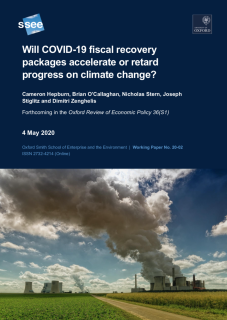
The COVID-19 crisis is likely to have dramatic consequences for progress on climate change. Imminent fiscal recovery packages could entrench or partly displace the current fossil-fuel-intensive economic system. This report provides the results from surveys of 231 central bank officials, finance ministry officials, and other economic experts from G20 countries on the relative performance of 25 major fiscal recovery archetypes across four dimensions: speed of implementation, economic multiplier, climate impact potential, and overall desirability.
It identifies five policies with high potential on both economic multiplier and climate impact metrics: clean physical infrastructure, building efficiency retrofits, investment in education and training, natural capital investment, and clean research and development (R&D). These recommendations are contextualised through analysis of the short-run impacts of COVID-19 on greenhouse gas (GHG) curtailment and plausible medium-run shifts in the habits and behaviours of humans and institutions.
The report indicates that the biggest driver of the long-term impact on climate is through fiscal recovery packages, along with possible shifts in power within and across national and international institutions. Green fiscal recovery packages can act to decouple economic growth from GHG emissions and reduce existing welfare inequalities that will be exacerbated by the pandemic in the short-term and climate change in the long-term. Urgent rescue packages have been necessarily ‘colourless’ and focused on preserving liquidity, solvency, and livelihoods, but their climate impact is also unlikely to be positive. Short-term reductions in GHG emissions resulting from lockdowns will themselves have minor long-term effects, unless they facilitate deeper and longer-term human, business, and institutional changes.
